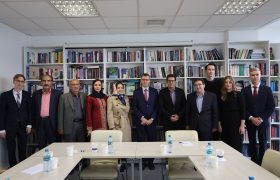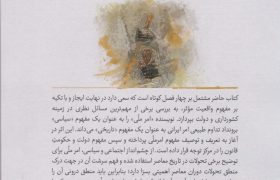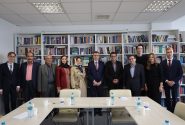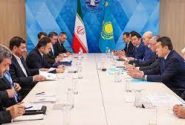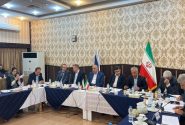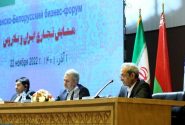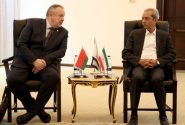A review session titled “The Iranian Narrative and Analysis of the Historical Developments of Russia” was held at KhabarOnline, featuring the unveiling of the book “Neo-Conservatism in the Putin Era: Roots and Ideas” authored by Mehdi Sanaei, Associate Professor at the University of Tehran and Political Advisor to the President. The session was organized in collaboration with the Institute for Iran-Eurasia Studies (IRAS) and featured Mehdi Sanaei (the book’s author), Mohammad Javad Zarif (Associate Professor at the Faculty of World Studies, University of Tehran), Ebrahim Motaghi (Dean of the Faculty of Law and Political Science, University of Tehran), and Hossein Salimi (President of the Iranian Political Science Association). It took place on Monday, April 22, 2024 (1st Ordibehesht 1404), from 4:00 PM to 6:00 PM at the KhabarOnline News Agency.
Mehdi Sanaei: Understanding Russia as a Prerequisite for National Self-Awareness
Mehdi Sanaei, author of “Neo-Conservatism in the Putin Era,” began the session by stating, “It is believed that we face challenges in understanding the world around us because countries with established civilizations often focus on self-reflection and pivotal moments in their history, potentially prioritizing this over understanding the external world. Sociologists argue that understanding the world is crucial for a nation’s self-awareness, especially in today’s world. Therefore, the primary goal of this book is to strive to understand our surroundings, with Russia being the focal point of this study.”
In the “Political Thought of Russia” chapter of his book, “Neo-Conservatism in the Putin Era,” Dr. Mehdi Sanaei emphasizes the deep affinity between Iranian and Russian intellectual discourses. He notes that the book is the product of years of research experiences and field studies conducted before 2024 (1403), a period during which he held no executive responsibilities, allowing him ample time for academic reflection on Russia’s political developments. The primary motivation for writing the book was both personal interest and addressing a significant gap in the introduction of Russian intellectual and philosophical currents in Persian texts, as research and translations in Iran have primarily focused on post-Soviet military and security schools of thought.
Pointing out the historical scarcity of “current-centric” analyses of Russian philosophical and intellectual trends in Russian studies, he describes his book as a comprehensive exploration that integrates indigenous and Western academic experiences. In his redefinition of the concept of Russian “neo-conservatism,” Sanaei emphasizes the re-creation of traditional Russian conservatism, distinguishing it from the Western understanding of conservatism. Furthermore, he demonstrates how certain Russian universities, initially cultivating liberalism, transformed into platforms for critiquing modernity following anti-modernization movements.
What Sanaei considers particularly significant is Russia’s role as a conduit through which modern manifestations and new ideas entered Iran. Consequently, any examination of Russian political thought inevitably necessitates a reference to Iran’s intellectual and cultural history. In this context, five points of identity and intellectual connection between the two countries are identified:
- A shared ancient origin (Arkaim), which some consider the origin of the Aryans.1
- Mutual influence during the Islamic era, from the Khazar rule to the Timurids and Tatars.
- The influence of German philosophy and science in both countries.
- Shared messianic beliefs between Shia Islam and Orthodox Christianity.
- Similar experiences in the path of political and social development, albeit with temporal differences.
In addition to this structural analysis, Sanaei alludes to the “cognitive distance” between the external perception of Russia and the Russians’ self-perception. Russians see themselves as history’s greatest victims—from the Tatar and Mongol invasions to the Napoleonic Wars and World War II—and this victim-centered perspective is constantly reiterated in their poetry and myths.2 From a foreign policy perspective, he emphasizes the need to avoid one-sided judgments and politicization, suggesting that Iran adopt a multi-vector approach in its interactions with Russia and other actors, creating diverse “baskets” of synergy, as one-sided media fuels extremist reactions in society.
In summary, Sanaei believes that a deep understanding of Russian political thought, achieved through the connection of intellectual, philosophical, and cultural history with Iran, can serve as the foundation for a realistic and emotionally detached foreign policy.




